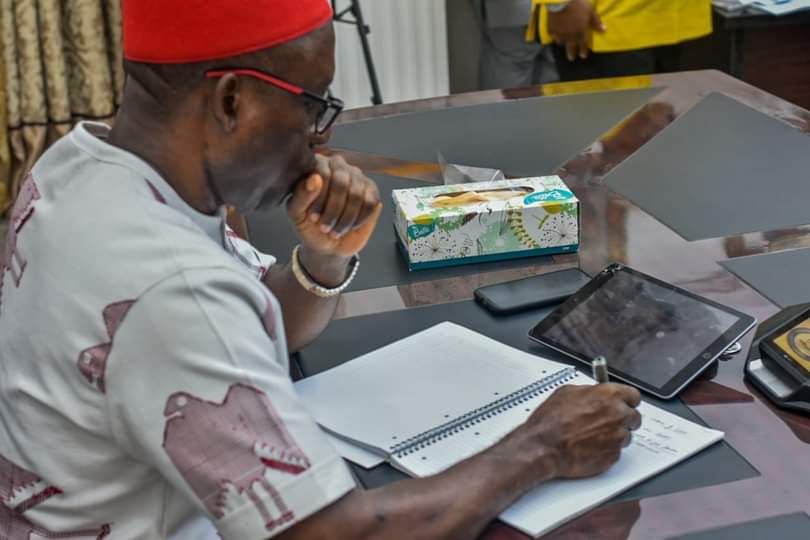Bottom-Top Development: The Soludo Approach To Governance
EJIKE ABANA

Prior to and even upon assumption of office as the Governor of Anambra state, grassroot development has been the nucleus of efforts and models of Professor Charles Chukwuma Soludo. He has said this, shown and demonstrated it on many occasions.
To further drive it down, recently, Governor Soludo inaugurated the Transition Committee Chairmen for the twenty-one local government areas of Anambra state. Needless to say that the local government system, shepherds development to the people at the grassroots level.
During the inauguration, Governor Soludo reiterated that his administration’s approach to governance is Bottom-Top model.
“We are looking for extraordinary services to be delivered to the people because we are looking up to you as the team that takes the Soludo solution to the grassroots- from below. We get that transformation from below; to our communities, our towns, our villages, the rural people, that woman selling pepper along the road, that vulcanizer out there, that hawker on the street, the okada rider, the keke driver, the woman who fries akara, and so on. That’s the essence. These are people we want to change their lives. That’s why government exists”, Soludo said. He has many times spoken about the Public Private, Community Partnership, PPCP model, Neni-Nnewi model. All these points to one thing- government cannot do development work alone. In fact, government always plays the facilitator role.
By focusing chiefly on capacity building, grassroots development promotes inclusiveness and resilience. It offers a space for communities to address local issues, find common ground and balance competing interests.
The experiences at the grassroots throughout the world have portrayed that solutions to underdevelopment necessarily focus on the negligence of the people ‘down there’. Think of the number of towns that exists in Anambra state and the number of people that live below point average. I think that those are the people for which government exists. That’s Soludo’s major target as typified by his plans and policies so far enunciated.
Improved techniques, machines and infrastructure mean little without a corresponding improvement in the political status of the poor who are sadly, more in number. Frankly speaking, without increased political power of the poor, technical solutions often aggravate existing inequalities.
Decades of development dictated, has proven that top-bottom strategies are unlikely to improve the lives of the poor. Top-Bottom approach had been in existence since. Isn’t it time to try the other way? Afterall, they say that it is only a fool that keeps acting in a specific way, expecting a different result. If we are sincere in getting a different result, the Bottom-Top approach is certainly the way to go.
In the 1970s “popular participation” emerged as the answer to the inefficiency and inequities of development. Seeing the need for greater control by the poor over the processes that affect their lives, some development organizations began to incorporate local input into the planning and implementation of projects.
In its most restricted form, participation applies only to the implementation of a development project or program. As one development planner explained, “after the detailed programmes have been well planned, we tell the people exactly what to do so they will understand their responsibility to participate.” So, participation is often distorted in this way to take control away from those directly affected. But others stress that participation in development must involve full local control in the planning, implementation, management and evaluation of a project. Defined in this way, participation implies control. This is exactly what Governor Soludo is trying to achieve- carrying the grassroot along.
But, where do we begin if the process demands a restructuring of power relationships to give greater control to the poor? Obviously, the process is multifaceted, with many levels of necessary action. But the basic point remains that the grassroot is one essential actor in this process of rounded development. Sadly, many governments shy away from this.
The grassroots serve as primary vehicles for popular participation in social and economic development. In societies where citizens’ involvement in local or national policies is limited, such grassroot organizations (which ought to be the government), may serve as the only means for participation.
Ideally, either through building alternative structures or through pressuring for change in existing structures, grassroots organizations present a challenge to the status quo. In typologies of grassroots organizations, theorists point to two general forms of grassroots action: self-help and confrontation. Some groups take on both these forms of action, as they see confrontation as the only way to bring government attention to their demands.
Back track. The grassroot play a critical role in laying the groundwork for the future. They provide a context for individual empowerment and group action, and even serve to hold governments accountable. Even where they are politically restricted, they work to maintain popular pressure on governments.
Summarily, the philosophy is very simple: If an outsider is willing to come and help by grabbing the bull’s tail, that’s great. But the grassroot are the ones who have to grab the bull by the horns. Or, as the Mossi says, “If the load you have to carry is too heavy to lift onto your head, then it is right to be glad of the hand that helps you. But a Mossi must always use two hands of his own.” Therefore, Ndi Anambra, the solution is here. Let’s continue to accord him all the support for a liveable and prosperous smart megacity.







